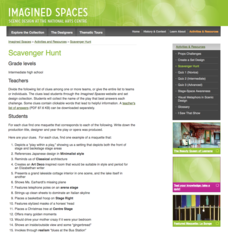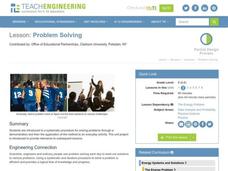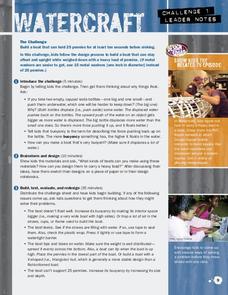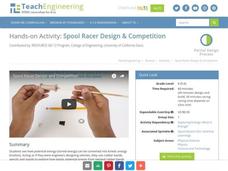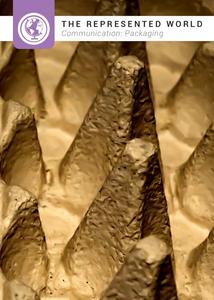Brigham Young University
Putting Ideas Together
As part of their study of set design, theater arts students put together what they have learned so far and create a thumbnail sketch of a set that they feel captures the style and mood they want to project.
Brigham Young University
It's All in the Details
Designers communicate their vision for a set through a progression from thumbnail sketches, to drawings, to renderings. After examining a series of renderings, class members begin work on their own rendering paying particular attention...
Brigham Young University
To-Scale Models
Guided by their analysis of a scene, their initial sketches, and renderings, set designers begin to craft a scaled, 3-D model of the set of the play they have chosen.
Brigham Young University
Computer Age
Theater arts class members get a chance to see how professionals employ tech tools. As they sketch, render, build models, and prepare presentations of the set design for a current show, learners either visit a professional theater or by...
Brigham Young University
Problems? Working it Out
Working in pairs, set designers take turns sharing their sketches, explaining how their renderings articulate their concept, and receiving feedback on concerns and questions.
Brigham Young University
The Presentation
As their final act in a 10-lesson theater arts unit, set designers present their models to the class and explain how their choices of line, color, and texture support the theme they wish to convey.
National Arts Centre
Scavenger Hunt
Young theatre artists engage in a scavenger hunt to acquaint themselves with set design. The challenge is to search the site and match a separate maquette with each of the 24 clues.
Teach Engineering
Problem Solving
Need a activity? Problem solved. Scholars learn about the problem-solving process in the sixth installment of a 25-part Energy Systems and Solutions unit. The particular process in question is the Technological Method of Problem Solving.
Teach Engineering
Design a Flying Machine
Wrap up the unit in one final design. Pairs use their knowledge of aviation to design new flying machines and record how their designs take into consideration the forces that act upon airplanes. The pupils determine whether their designs...
Teach Engineering
Future Flights: Imagine Your Own Flying Machines!
What will flying look like in the future? The 21st lesson plan in a 22-part unit on aviation reviews the major aspects of the lesson plan. Pupils brainstorm ideas of a future flying machine.
Teach Engineering
Balsa Glider Competition
Change one variable and try again. Teams build basic balsa gliders and collect data on their flight distances and times. Through collaboration, the team decides on two modifications to make to the basic design and collect data for the...
Teach Engineering
Will It Fly?
Go fly a kite, then fly a plane! The 19th part of a 22-part unit on aviation looks at the way kites and gliders help aid in the understanding of flight. Pupils discuss how engineers used kites to influence airplane designs.
Teach Engineering
Better By Design
Which modification is the best? Using the scientific method, pairs determine the effects of each control surface on the distance of a glider's flight. The activity, section 16 in a 22-part unit on aviation, allows pupils to gain a better...
Teach Engineering
Airplane Tails and Wings: Are You in Control?
Keep everything under control. The lesson, the 16th segment in a 22-part unit, provides a more detailed look at the parts of a plane, specifically the control surfaces. Pupils learn about the construction of the wings and the tails and...
Teach Engineering
Building-Testing-Improving Paper Airplanes: Head's Up!
Take foldables to all new heights. Pupils build and fly different types of paper airplanes in the 14th portion of a 22-part unit on aviation. Groups collect data on distance and flight time for each plane and compare the data from the...
Teach Engineering
Take Off with Paper Airplanes
Let's go fly a kite ... oops, a paper airplane! The 13th segment in an aviation unit of 22 relates the parts of an airplane to paper airplanes. Pupils learn the functions of the control surfaces of a plane to really make their knowledge...
PBS
Helping Hand
Reach out and grab something. Given the task of picking up objects at least two feet away, pupils design and build a grabber. The last activity in a series of five challenges requires learners to use information about fulcrums and levers.
PBS
Paper Table
What is black and white and re(a)d all over? Class members build a table out of rolled newspapers. Pupils follow the design process to design, build, and test their paper tables in the second challenge in a series of five.
PBS
Watercraft
Whatever floats your boat—with some additional weight. The first activity in a five-part series challenges pupils to design a boat to hold pennies. Using the design process, learners design, build, and test their boats, making sure they...
Teach Engineering
Maximum Mentos Fountain
A messy fountain is potentially an energy experiment in disguise. Groups investigate the variables in creating a fountain from soda and Mentos. The last activity in a six-part series on energy has the class observe the fountain in terms...
Teach Engineering
Spool Racer Design and Competition
Wind it up and let it go. Individuals build a basic spool racer in the second portion of a six-part unit on energy. After receiving three criteria, pupils modify their designs to meet the new challenge. Pairs compete against each other...
DiscoverE
Air-Powered Mini Rocket
Does the position of the clips make a difference? The activity provides directions to build and test a paper rocket. Pupils attach paper clips to the rocket in different configurations and measure the distance the rocket flies each time....
DiscoverE
Let's Make an Elastic Puppet
Create bending joints—but don't break! The activity shows how to make a puppet using straws and fishing line. Pupils create cuts to make joints that rely on the elasticity of the straw to bend and return to their original shapes.
Indiana Department of Education
The Represented World: Communication—Packaging
Challenge your classes to design and market a new product. Collaborative groups use geometry skills to create packaging for their products. Finally, they plan a marketing strategy to present to a marketing specialist.








